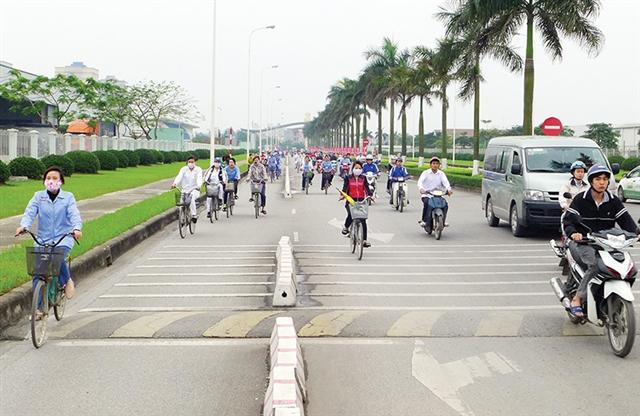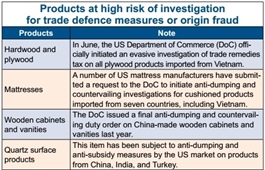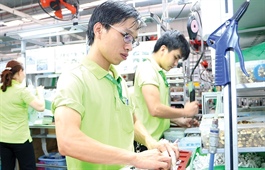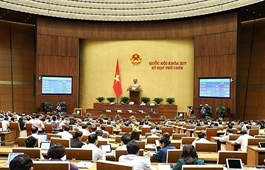Businesses endeavour to retain employees
Businesses endeavour to retain employees
More than 7.8 million workers lost their jobs in the first half of 2020, putting severe pressure on labour authorities to tackle social security issues. But contrary to the trend of labour cuts in the context of common difficulties, many businesses in Vietnam respond quickly to the problem to prepare for a new normal.

Unemployment is one of the side effects caused by the pandemic, Photo: Dung Minh
|
While visiting the Hanoi Centre for Employment Services to carry out procedures for unemployment benefits, 28-year-old Nguyen Thi Oanh was acquainted by an employee of a life insurance company who advised her about the retirement insurance package.
Life insurance agent Hong Bien asked Oanh about her job and income, then built a template of the pension fund based on the amount she wanted to receive monthly after retirement. “Bien said I only need to pay around VND300 million ($14,400) for 15 years, but when I retire at the age of 60, I would have savings of nearly VND1 billion ($44,400)”, Oanh said.
Oanh’s insurance package each month is about VND2.2 million ($96), which she can either pay monthly or once a year. As she got convinced, Oanh plans to use the entire unemployment insurance of more than VND20 million ($870) to pay the first year of this insurance fund, even though she is still unemployed and will not know when she can get a new job. “Accepting these benefits will continue to be difficult for a few months, but I may not be unemployed forever. Investing in the future is a smart decision,” Oanh said.
However, Oanh will not only face difficulties during the next few months, but may also lose her unemployment benefits if she cannot pay the VND2.2 million per month for a minimum of two years.
Oanh’s story is just one of many unemployed workers. Not only are they secondary victims of the COVID-19 pandemic, they are also creating great pressure on the national social security system if such unemployment is increasingly lasting. Therefore, supporting and creating jobs for these workers is necessary and urgent to minimise negative impacts on society.
One of the solutions to help reduce unemployment is to quickly assist businesses in difficulties to stabilise production early and to avoid mass layoffs. A recent survey of VietnamWorks with 400 enterprises and 3,400 jobseekers showed that 40 per cent of businesses were affected by the disease, while 30 per cent of them have cut their staff to maintain operation throughout the crisis. Meanwhile, 10 per cent of companies chose to cut back on wages and benefits. In particular, textile and footwear companies were the most affected group.
According to statistics from the Ministry of Industry and Trade, Vietnam currently has nearly 3,000 enterprises operating in the footwear industry with more than one million employees working in the tanning industry and 500,000 in supporting industries. Meanwhile, the textile industry has about 5,000 businesses and about 2.5 million workers.
However, the outbreak of COVID-19 caused the textile and footwear industry and many others to face order shortages. Therefore, many businesses have had to lay off workers. In June, Hue Phong Footwear JSC was forced to end the contracts of over 2,200 workers and relocate its production base to Tra Vinh province. At the same time, PouYuen Vietnam Company Ltd., with more than 60,000 employees, reduced its staff by nearly 2,800 workers and is expected to lay off more than 3,000 more in August.
It is predicted that in the next few months, the number of laid-off workers will increase while the main export markets of Vietnam such as the United States, Europe, and China are still affected by the pandemic.
Facing these hurdles, many businesses have considered how to cope with them. While some choose to reduce costs by cutting staff, the remainder have shown sufficient capacity to maintain and continue operations. Determining the risk of labour shortage when returning, these businesses are still trying to retain workers.
Pham Tien Dung, chairman of PCB Cat Tuong Electronic Production Co., Ltd., said that the biggest concern for businesses is production materials, labour resources, and capital. Therefore, the company clearly identified that retaining workers during and after the pandemic is a top priority. “Although it is very difficult, we have never thought of cutting down any employees. In order to retain workers, the company is forced to use the reserve capital to pay their salaries,” Dung said. Currently the group employs nearly 100 workers.
Meanwhile, 666 enterprises and nearly 17,000 labourers that are part of Hanoi Industrial and Export Processing Zones Management Authority (HIZA) said that, although enterprises are facing difficulties during this stressful pandemic, no business had to close.
Le Quang Long, deputy director at the HIZA, said they have instructed their members to support their labourers in accordance with the regulations of the Ministry of Labour, Invalids and Social Affairs, ensuring that employees are entitled to proper and adequate benefits.
In addition, the HIZA has conducted several reforms to support businesses to solve problems and soon re-stabilise their production. Moreover, the HIZA’s trade union has also been carrying out social activities such as organising a zero-VND supermarket, and offering rice and other provisions.


























